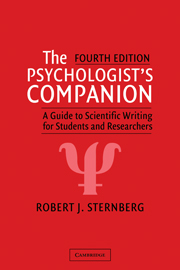Book contents
- Frontmatter
- Contents
- Acknowledgments
- Introduction
- 1 Eight Common Misconceptions about Psychology Papers
- 2 Steps in Writing the Library Research Paper
- 3 Steps in Writing the Experimental Research Paper
- 4 Rules for Writing the Psychology Paper
- 5 Using the Internet to Aid the Research Process
- 6 Commonly Misused Words
- 7 American Psychological Association Guidelines for Psychology Papers
- 8 Guidelines for Data Presentation
- 9 References for the Psychology Paper
- 10 Standards for Evaluating the Psychology Paper
- 11 Submitting a Paper to a Journal
- 12 How to Win Acceptances from Psychology Journals: Twenty-Nine Tips for Better Writing
- 13 Writing a Grant or Contract Proposal
- 14 How to Find a Book Publisher
- 15 Writing a Lecture
- 16 Article Writing 101
- References
- Appendix A Sample Psychology Paper
- Appendix B Writing for British and European Journals
- Index
10 - Standards for Evaluating the Psychology Paper
Published online by Cambridge University Press: 05 June 2012
- Frontmatter
- Contents
- Acknowledgments
- Introduction
- 1 Eight Common Misconceptions about Psychology Papers
- 2 Steps in Writing the Library Research Paper
- 3 Steps in Writing the Experimental Research Paper
- 4 Rules for Writing the Psychology Paper
- 5 Using the Internet to Aid the Research Process
- 6 Commonly Misused Words
- 7 American Psychological Association Guidelines for Psychology Papers
- 8 Guidelines for Data Presentation
- 9 References for the Psychology Paper
- 10 Standards for Evaluating the Psychology Paper
- 11 Submitting a Paper to a Journal
- 12 How to Win Acceptances from Psychology Journals: Twenty-Nine Tips for Better Writing
- 13 Writing a Grant or Contract Proposal
- 14 How to Find a Book Publisher
- 15 Writing a Lecture
- 16 Article Writing 101
- References
- Appendix A Sample Psychology Paper
- Appendix B Writing for British and European Journals
- Index
Summary
In this chapter, I will enumerate some of the standards I believe my colleagues and I use in evaluating the contribution to knowledge made by psychology papers. Little has been written about how psychologists evaluate a paper's contribution. Nor have psychologists passed down from one generation to another a clearly explicated spoken tradition of evaluative standards. It is therefore remarkable that psychologists find a high level of agreement in their evaluations of each others' papers. In an Annual Review of Psychology chapter reviewing the literature on memory and verbal learning, Tulving and Madigan (1970) noted their own remarkable agreement in evaluations of papers, and at the same time offered some keenly perceptive tonguein-cheek comments regarding the state of the literature:
In the course of preparation for this chapter, we selected a sample of 540 publications – slightly less than one half of all relevant publications that appeared during the main time-period under review here – and independently rated each paper in terms of its “contribution to knowledge”. We agreed to a remarkable extent in classifying all papers into three categories. The first, containing approximately two thirds of all papers, could be labeled “utterly inconsequential.” The primary function these papers serve is giving something to do to people who count papers instead of reading them. Future research and understanding of verbal learning and memory would not be affected at all if none of the papers in this category had seen the light of day. […]
- Type
- Chapter
- Information
- The Psychologist's CompanionA Guide to Scientific Writing for Students and Researchers, pp. 198 - 215Publisher: Cambridge University PressPrint publication year: 2003



